Investigating Challenges in Accessing Diabetes Information and Care
VerifiedAdded on 2023/04/20
|13
|3140
|344
AI Summary
This research proposal investigates the challenges faced by individuals with diabetes in accessing appropriate medical care services and health-related information in the UK. It highlights the increasing global prevalence of diabetes and its associated complications, emphasizing the need to address barriers to care. The proposal employs Penchansky and Thomas's Theory of Access as a framework, focusing on dimensions like affordability, availability, accessibility, acceptability, and adequacy. Using a qualitative approach, the methodology involves a comprehensive search of databases like MEDLINE, CINAHL, and EMBASE, adhering to specific inclusion and exclusion criteria. The expected outcomes include identifying themes such as financial barriers, lack of awareness, limited resources, and inadequate health coverage. The research also considers ethical implications, aiming to contribute to improved health outcomes for diabetes patients. Desklib offers a platform for students to access this and other solved assignments.
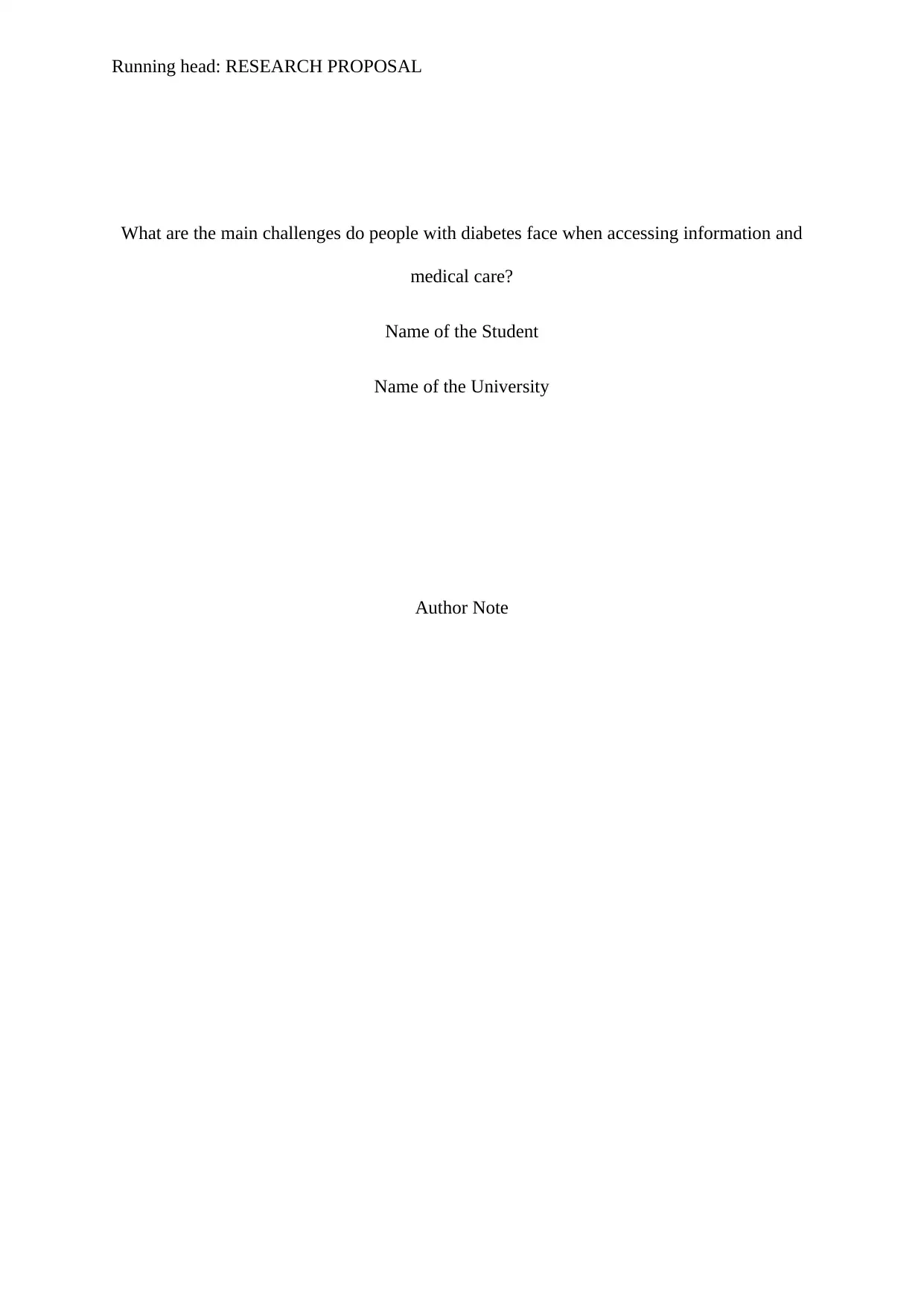
Running head: RESEARCH PROPOSAL
What are the main challenges do people with diabetes face when accessing information and
medical care?
Name of the Student
Name of the University
Author Note
What are the main challenges do people with diabetes face when accessing information and
medical care?
Name of the Student
Name of the University
Author Note
Paraphrase This Document
Need a fresh take? Get an instant paraphrase of this document with our AI Paraphraser
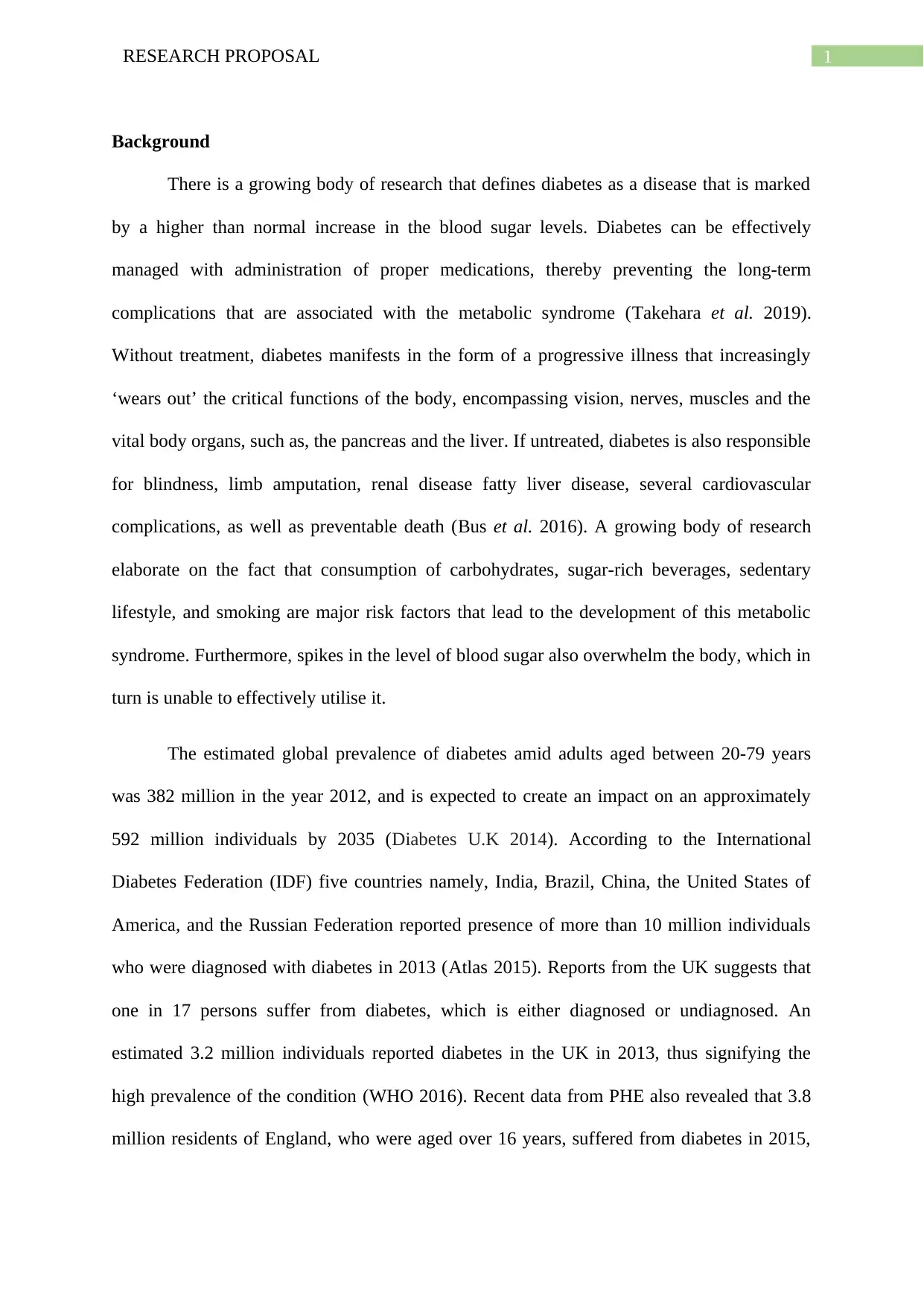
1RESEARCH PROPOSAL
Background
There is a growing body of research that defines diabetes as a disease that is marked
by a higher than normal increase in the blood sugar levels. Diabetes can be effectively
managed with administration of proper medications, thereby preventing the long-term
complications that are associated with the metabolic syndrome (Takehara et al. 2019).
Without treatment, diabetes manifests in the form of a progressive illness that increasingly
‘wears out’ the critical functions of the body, encompassing vision, nerves, muscles and the
vital body organs, such as, the pancreas and the liver. If untreated, diabetes is also responsible
for blindness, limb amputation, renal disease fatty liver disease, several cardiovascular
complications, as well as preventable death (Bus et al. 2016). A growing body of research
elaborate on the fact that consumption of carbohydrates, sugar-rich beverages, sedentary
lifestyle, and smoking are major risk factors that lead to the development of this metabolic
syndrome. Furthermore, spikes in the level of blood sugar also overwhelm the body, which in
turn is unable to effectively utilise it.
The estimated global prevalence of diabetes amid adults aged between 20-79 years
was 382 million in the year 2012, and is expected to create an impact on an approximately
592 million individuals by 2035 (Diabetes U.K 2014). According to the International
Diabetes Federation (IDF) five countries namely, India, Brazil, China, the United States of
America, and the Russian Federation reported presence of more than 10 million individuals
who were diagnosed with diabetes in 2013 (Atlas 2015). Reports from the UK suggests that
one in 17 persons suffer from diabetes, which is either diagnosed or undiagnosed. An
estimated 3.2 million individuals reported diabetes in the UK in 2013, thus signifying the
high prevalence of the condition (WHO 2016). Recent data from PHE also revealed that 3.8
million residents of England, who were aged over 16 years, suffered from diabetes in 2015,
Background
There is a growing body of research that defines diabetes as a disease that is marked
by a higher than normal increase in the blood sugar levels. Diabetes can be effectively
managed with administration of proper medications, thereby preventing the long-term
complications that are associated with the metabolic syndrome (Takehara et al. 2019).
Without treatment, diabetes manifests in the form of a progressive illness that increasingly
‘wears out’ the critical functions of the body, encompassing vision, nerves, muscles and the
vital body organs, such as, the pancreas and the liver. If untreated, diabetes is also responsible
for blindness, limb amputation, renal disease fatty liver disease, several cardiovascular
complications, as well as preventable death (Bus et al. 2016). A growing body of research
elaborate on the fact that consumption of carbohydrates, sugar-rich beverages, sedentary
lifestyle, and smoking are major risk factors that lead to the development of this metabolic
syndrome. Furthermore, spikes in the level of blood sugar also overwhelm the body, which in
turn is unable to effectively utilise it.
The estimated global prevalence of diabetes amid adults aged between 20-79 years
was 382 million in the year 2012, and is expected to create an impact on an approximately
592 million individuals by 2035 (Diabetes U.K 2014). According to the International
Diabetes Federation (IDF) five countries namely, India, Brazil, China, the United States of
America, and the Russian Federation reported presence of more than 10 million individuals
who were diagnosed with diabetes in 2013 (Atlas 2015). Reports from the UK suggests that
one in 17 persons suffer from diabetes, which is either diagnosed or undiagnosed. An
estimated 3.2 million individuals reported diabetes in the UK in 2013, thus signifying the
high prevalence of the condition (WHO 2016). Recent data from PHE also revealed that 3.8
million residents of England, who were aged over 16 years, suffered from diabetes in 2015,
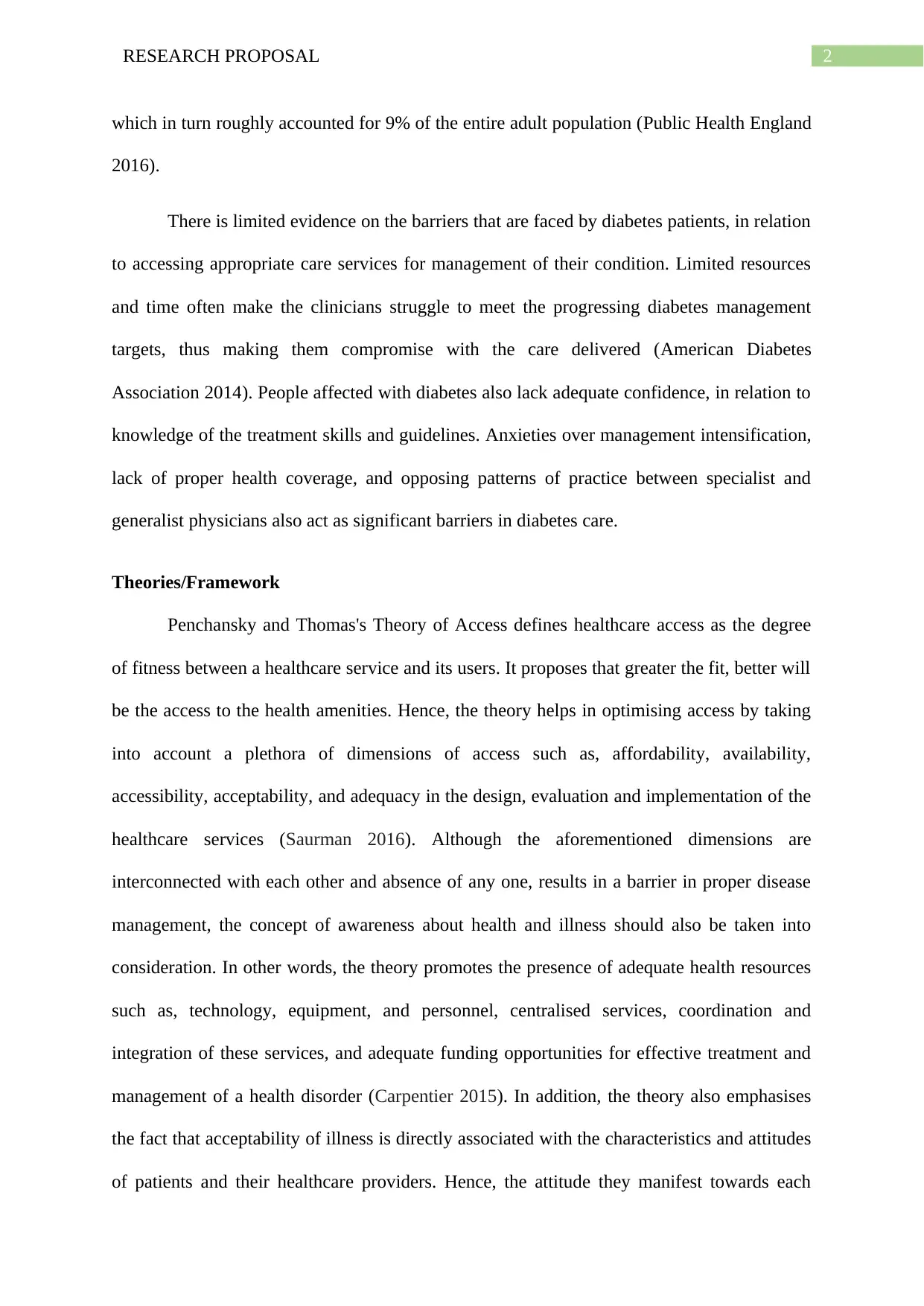
2RESEARCH PROPOSAL
which in turn roughly accounted for 9% of the entire adult population (Public Health England
2016).
There is limited evidence on the barriers that are faced by diabetes patients, in relation
to accessing appropriate care services for management of their condition. Limited resources
and time often make the clinicians struggle to meet the progressing diabetes management
targets, thus making them compromise with the care delivered (American Diabetes
Association 2014). People affected with diabetes also lack adequate confidence, in relation to
knowledge of the treatment skills and guidelines. Anxieties over management intensification,
lack of proper health coverage, and opposing patterns of practice between specialist and
generalist physicians also act as significant barriers in diabetes care.
Theories/Framework
Penchansky and Thomas's Theory of Access defines healthcare access as the degree
of fitness between a healthcare service and its users. It proposes that greater the fit, better will
be the access to the health amenities. Hence, the theory helps in optimising access by taking
into account a plethora of dimensions of access such as, affordability, availability,
accessibility, acceptability, and adequacy in the design, evaluation and implementation of the
healthcare services (Saurman 2016). Although the aforementioned dimensions are
interconnected with each other and absence of any one, results in a barrier in proper disease
management, the concept of awareness about health and illness should also be taken into
consideration. In other words, the theory promotes the presence of adequate health resources
such as, technology, equipment, and personnel, centralised services, coordination and
integration of these services, and adequate funding opportunities for effective treatment and
management of a health disorder (Carpentier 2015). In addition, the theory also emphasises
the fact that acceptability of illness is directly associated with the characteristics and attitudes
of patients and their healthcare providers. Hence, the attitude they manifest towards each
which in turn roughly accounted for 9% of the entire adult population (Public Health England
2016).
There is limited evidence on the barriers that are faced by diabetes patients, in relation
to accessing appropriate care services for management of their condition. Limited resources
and time often make the clinicians struggle to meet the progressing diabetes management
targets, thus making them compromise with the care delivered (American Diabetes
Association 2014). People affected with diabetes also lack adequate confidence, in relation to
knowledge of the treatment skills and guidelines. Anxieties over management intensification,
lack of proper health coverage, and opposing patterns of practice between specialist and
generalist physicians also act as significant barriers in diabetes care.
Theories/Framework
Penchansky and Thomas's Theory of Access defines healthcare access as the degree
of fitness between a healthcare service and its users. It proposes that greater the fit, better will
be the access to the health amenities. Hence, the theory helps in optimising access by taking
into account a plethora of dimensions of access such as, affordability, availability,
accessibility, acceptability, and adequacy in the design, evaluation and implementation of the
healthcare services (Saurman 2016). Although the aforementioned dimensions are
interconnected with each other and absence of any one, results in a barrier in proper disease
management, the concept of awareness about health and illness should also be taken into
consideration. In other words, the theory promotes the presence of adequate health resources
such as, technology, equipment, and personnel, centralised services, coordination and
integration of these services, and adequate funding opportunities for effective treatment and
management of a health disorder (Carpentier 2015). In addition, the theory also emphasises
the fact that acceptability of illness is directly associated with the characteristics and attitudes
of patients and their healthcare providers. Hence, the attitude they manifest towards each
⊘ This is a preview!⊘
Do you want full access?
Subscribe today to unlock all pages.

Trusted by 1+ million students worldwide
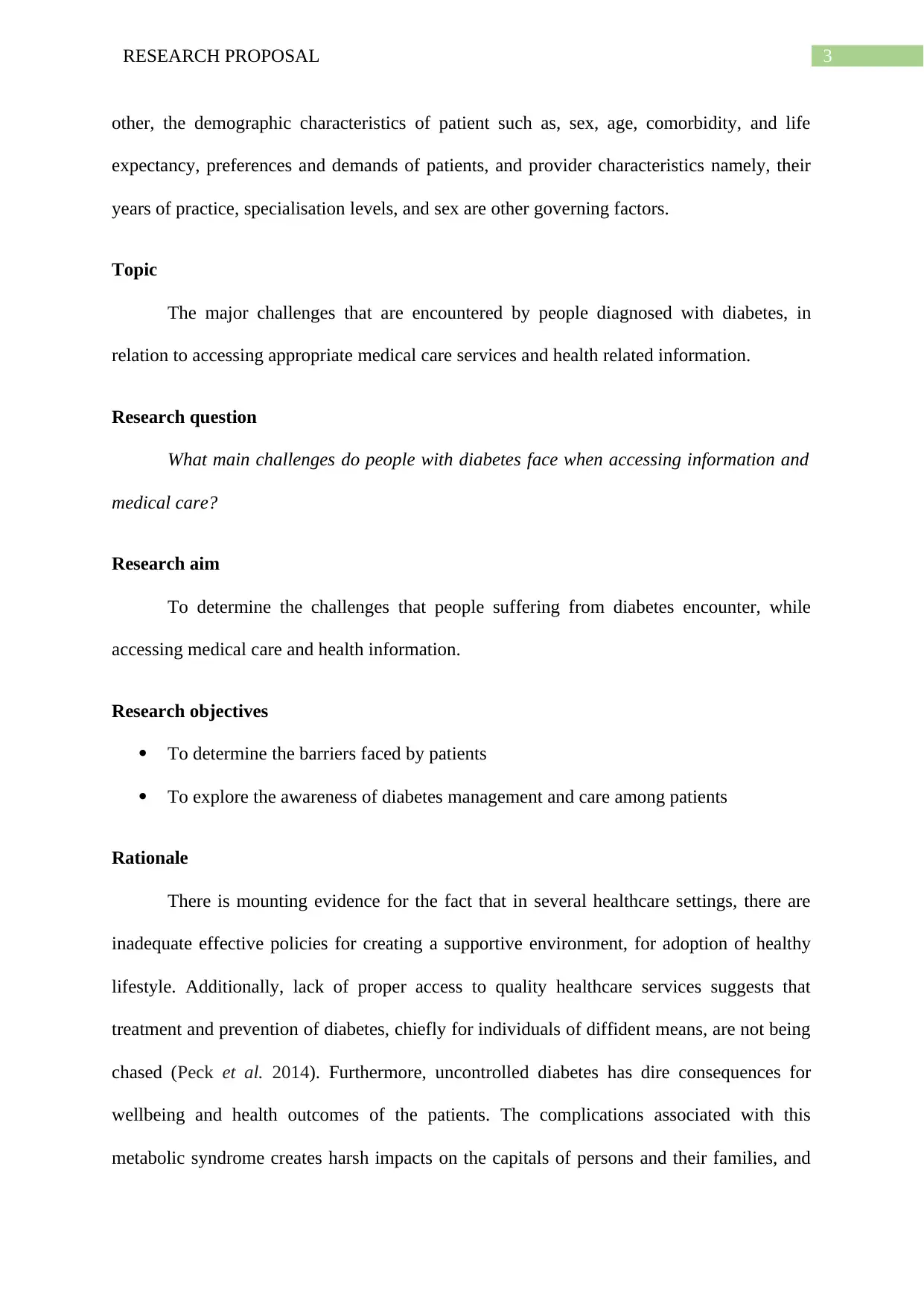
3RESEARCH PROPOSAL
other, the demographic characteristics of patient such as, sex, age, comorbidity, and life
expectancy, preferences and demands of patients, and provider characteristics namely, their
years of practice, specialisation levels, and sex are other governing factors.
Topic
The major challenges that are encountered by people diagnosed with diabetes, in
relation to accessing appropriate medical care services and health related information.
Research question
What main challenges do people with diabetes face when accessing information and
medical care?
Research aim
To determine the challenges that people suffering from diabetes encounter, while
accessing medical care and health information.
Research objectives
To determine the barriers faced by patients
To explore the awareness of diabetes management and care among patients
Rationale
There is mounting evidence for the fact that in several healthcare settings, there are
inadequate effective policies for creating a supportive environment, for adoption of healthy
lifestyle. Additionally, lack of proper access to quality healthcare services suggests that
treatment and prevention of diabetes, chiefly for individuals of diffident means, are not being
chased (Peck et al. 2014). Furthermore, uncontrolled diabetes has dire consequences for
wellbeing and health outcomes of the patients. The complications associated with this
metabolic syndrome creates harsh impacts on the capitals of persons and their families, and
other, the demographic characteristics of patient such as, sex, age, comorbidity, and life
expectancy, preferences and demands of patients, and provider characteristics namely, their
years of practice, specialisation levels, and sex are other governing factors.
Topic
The major challenges that are encountered by people diagnosed with diabetes, in
relation to accessing appropriate medical care services and health related information.
Research question
What main challenges do people with diabetes face when accessing information and
medical care?
Research aim
To determine the challenges that people suffering from diabetes encounter, while
accessing medical care and health information.
Research objectives
To determine the barriers faced by patients
To explore the awareness of diabetes management and care among patients
Rationale
There is mounting evidence for the fact that in several healthcare settings, there are
inadequate effective policies for creating a supportive environment, for adoption of healthy
lifestyle. Additionally, lack of proper access to quality healthcare services suggests that
treatment and prevention of diabetes, chiefly for individuals of diffident means, are not being
chased (Peck et al. 2014). Furthermore, uncontrolled diabetes has dire consequences for
wellbeing and health outcomes of the patients. The complications associated with this
metabolic syndrome creates harsh impacts on the capitals of persons and their families, and
Paraphrase This Document
Need a fresh take? Get an instant paraphrase of this document with our AI Paraphraser
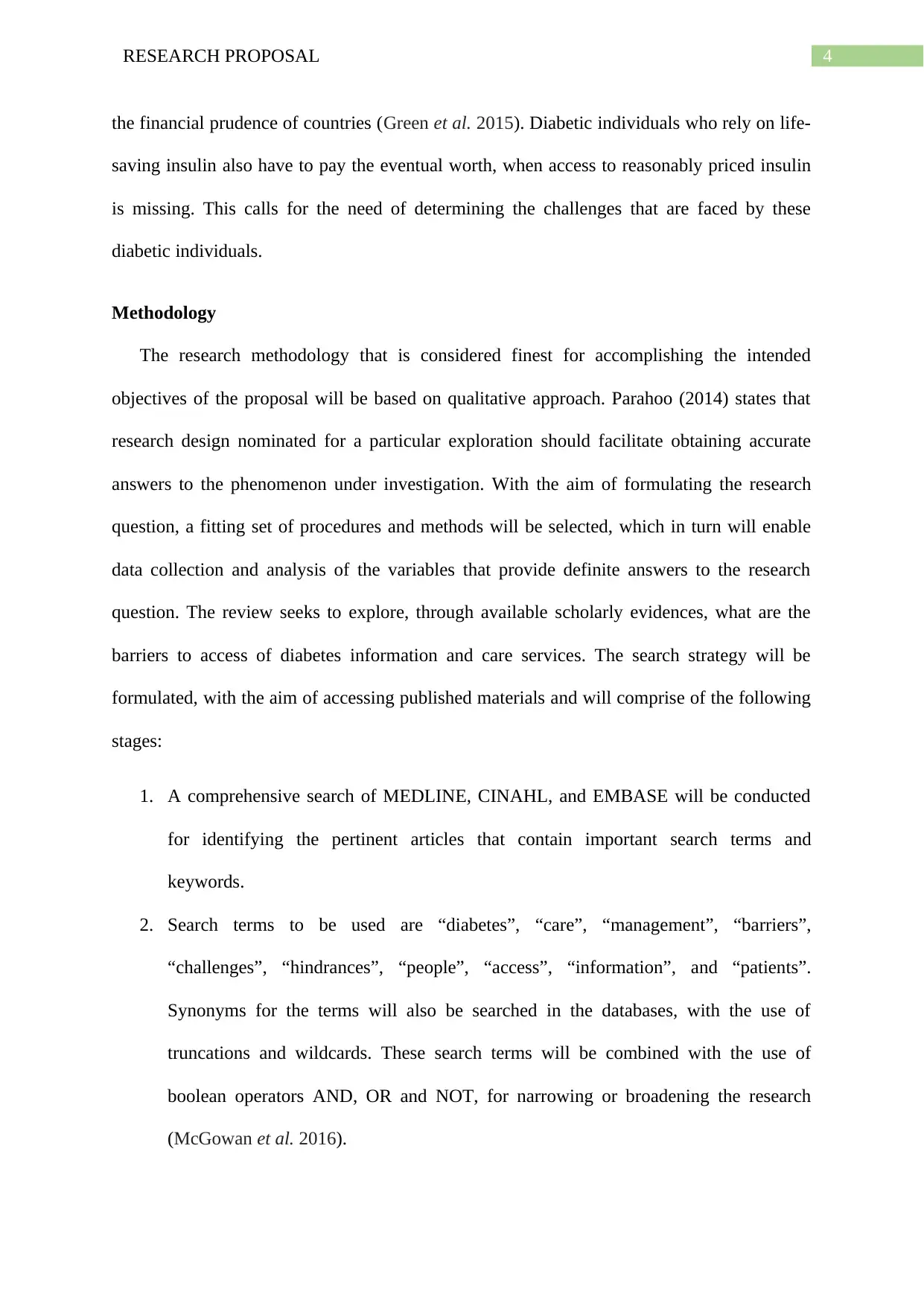
4RESEARCH PROPOSAL
the financial prudence of countries (Green et al. 2015). Diabetic individuals who rely on life-
saving insulin also have to pay the eventual worth, when access to reasonably priced insulin
is missing. This calls for the need of determining the challenges that are faced by these
diabetic individuals.
Methodology
The research methodology that is considered finest for accomplishing the intended
objectives of the proposal will be based on qualitative approach. Parahoo (2014) states that
research design nominated for a particular exploration should facilitate obtaining accurate
answers to the phenomenon under investigation. With the aim of formulating the research
question, a fitting set of procedures and methods will be selected, which in turn will enable
data collection and analysis of the variables that provide definite answers to the research
question. The review seeks to explore, through available scholarly evidences, what are the
barriers to access of diabetes information and care services. The search strategy will be
formulated, with the aim of accessing published materials and will comprise of the following
stages:
1. A comprehensive search of MEDLINE, CINAHL, and EMBASE will be conducted
for identifying the pertinent articles that contain important search terms and
keywords.
2. Search terms to be used are “diabetes”, “care”, “management”, “barriers”,
“challenges”, “hindrances”, “people”, “access”, “information”, and “patients”.
Synonyms for the terms will also be searched in the databases, with the use of
truncations and wildcards. These search terms will be combined with the use of
boolean operators AND, OR and NOT, for narrowing or broadening the research
(McGowan et al. 2016).
the financial prudence of countries (Green et al. 2015). Diabetic individuals who rely on life-
saving insulin also have to pay the eventual worth, when access to reasonably priced insulin
is missing. This calls for the need of determining the challenges that are faced by these
diabetic individuals.
Methodology
The research methodology that is considered finest for accomplishing the intended
objectives of the proposal will be based on qualitative approach. Parahoo (2014) states that
research design nominated for a particular exploration should facilitate obtaining accurate
answers to the phenomenon under investigation. With the aim of formulating the research
question, a fitting set of procedures and methods will be selected, which in turn will enable
data collection and analysis of the variables that provide definite answers to the research
question. The review seeks to explore, through available scholarly evidences, what are the
barriers to access of diabetes information and care services. The search strategy will be
formulated, with the aim of accessing published materials and will comprise of the following
stages:
1. A comprehensive search of MEDLINE, CINAHL, and EMBASE will be conducted
for identifying the pertinent articles that contain important search terms and
keywords.
2. Search terms to be used are “diabetes”, “care”, “management”, “barriers”,
“challenges”, “hindrances”, “people”, “access”, “information”, and “patients”.
Synonyms for the terms will also be searched in the databases, with the use of
truncations and wildcards. These search terms will be combined with the use of
boolean operators AND, OR and NOT, for narrowing or broadening the research
(McGowan et al. 2016).
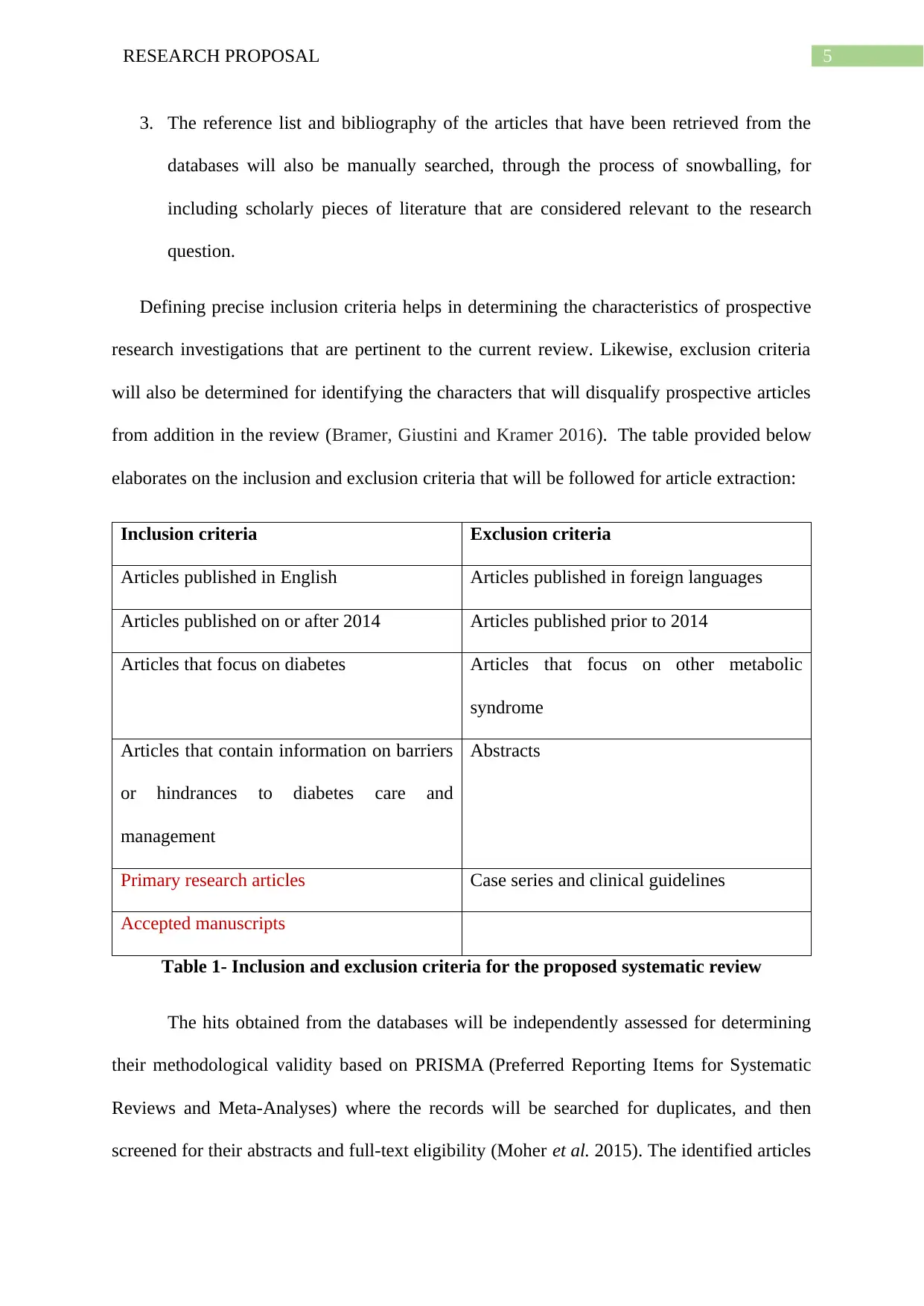
5RESEARCH PROPOSAL
3. The reference list and bibliography of the articles that have been retrieved from the
databases will also be manually searched, through the process of snowballing, for
including scholarly pieces of literature that are considered relevant to the research
question.
Defining precise inclusion criteria helps in determining the characteristics of prospective
research investigations that are pertinent to the current review. Likewise, exclusion criteria
will also be determined for identifying the characters that will disqualify prospective articles
from addition in the review (Bramer, Giustini and Kramer 2016). The table provided below
elaborates on the inclusion and exclusion criteria that will be followed for article extraction:
Inclusion criteria Exclusion criteria
Articles published in English Articles published in foreign languages
Articles published on or after 2014 Articles published prior to 2014
Articles that focus on diabetes Articles that focus on other metabolic
syndrome
Articles that contain information on barriers
or hindrances to diabetes care and
management
Abstracts
Primary research articles Case series and clinical guidelines
Accepted manuscripts
Table 1- Inclusion and exclusion criteria for the proposed systematic review
The hits obtained from the databases will be independently assessed for determining
their methodological validity based on PRISMA (Preferred Reporting Items for Systematic
Reviews and Meta-Analyses) where the records will be searched for duplicates, and then
screened for their abstracts and full-text eligibility (Moher et al. 2015). The identified articles
3. The reference list and bibliography of the articles that have been retrieved from the
databases will also be manually searched, through the process of snowballing, for
including scholarly pieces of literature that are considered relevant to the research
question.
Defining precise inclusion criteria helps in determining the characteristics of prospective
research investigations that are pertinent to the current review. Likewise, exclusion criteria
will also be determined for identifying the characters that will disqualify prospective articles
from addition in the review (Bramer, Giustini and Kramer 2016). The table provided below
elaborates on the inclusion and exclusion criteria that will be followed for article extraction:
Inclusion criteria Exclusion criteria
Articles published in English Articles published in foreign languages
Articles published on or after 2014 Articles published prior to 2014
Articles that focus on diabetes Articles that focus on other metabolic
syndrome
Articles that contain information on barriers
or hindrances to diabetes care and
management
Abstracts
Primary research articles Case series and clinical guidelines
Accepted manuscripts
Table 1- Inclusion and exclusion criteria for the proposed systematic review
The hits obtained from the databases will be independently assessed for determining
their methodological validity based on PRISMA (Preferred Reporting Items for Systematic
Reviews and Meta-Analyses) where the records will be searched for duplicates, and then
screened for their abstracts and full-text eligibility (Moher et al. 2015). The identified articles
⊘ This is a preview!⊘
Do you want full access?
Subscribe today to unlock all pages.

Trusted by 1+ million students worldwide
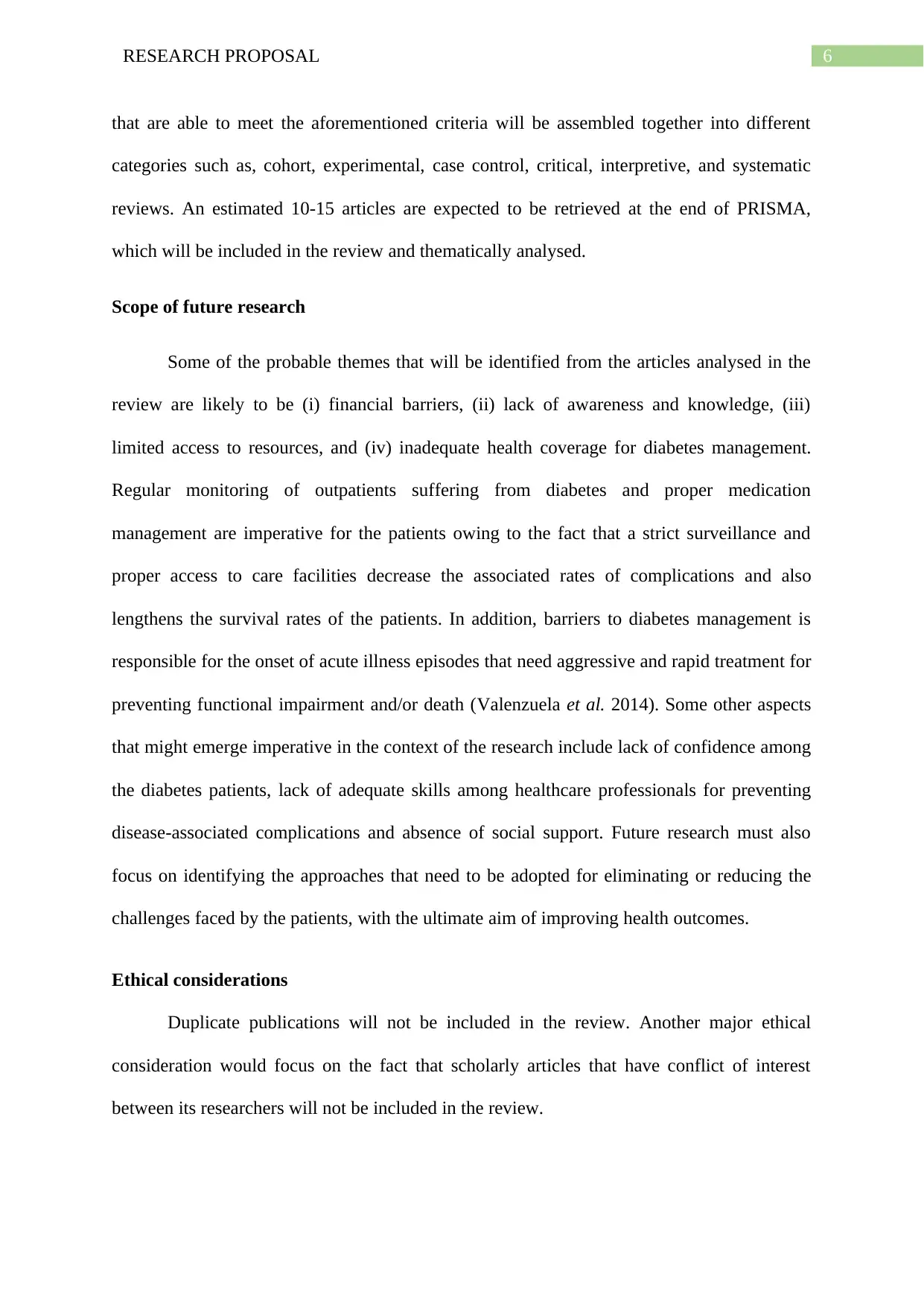
6RESEARCH PROPOSAL
that are able to meet the aforementioned criteria will be assembled together into different
categories such as, cohort, experimental, case control, critical, interpretive, and systematic
reviews. An estimated 10-15 articles are expected to be retrieved at the end of PRISMA,
which will be included in the review and thematically analysed.
Scope of future research
Some of the probable themes that will be identified from the articles analysed in the
review are likely to be (i) financial barriers, (ii) lack of awareness and knowledge, (iii)
limited access to resources, and (iv) inadequate health coverage for diabetes management.
Regular monitoring of outpatients suffering from diabetes and proper medication
management are imperative for the patients owing to the fact that a strict surveillance and
proper access to care facilities decrease the associated rates of complications and also
lengthens the survival rates of the patients. In addition, barriers to diabetes management is
responsible for the onset of acute illness episodes that need aggressive and rapid treatment for
preventing functional impairment and/or death (Valenzuela et al. 2014). Some other aspects
that might emerge imperative in the context of the research include lack of confidence among
the diabetes patients, lack of adequate skills among healthcare professionals for preventing
disease-associated complications and absence of social support. Future research must also
focus on identifying the approaches that need to be adopted for eliminating or reducing the
challenges faced by the patients, with the ultimate aim of improving health outcomes.
Ethical considerations
Duplicate publications will not be included in the review. Another major ethical
consideration would focus on the fact that scholarly articles that have conflict of interest
between its researchers will not be included in the review.
that are able to meet the aforementioned criteria will be assembled together into different
categories such as, cohort, experimental, case control, critical, interpretive, and systematic
reviews. An estimated 10-15 articles are expected to be retrieved at the end of PRISMA,
which will be included in the review and thematically analysed.
Scope of future research
Some of the probable themes that will be identified from the articles analysed in the
review are likely to be (i) financial barriers, (ii) lack of awareness and knowledge, (iii)
limited access to resources, and (iv) inadequate health coverage for diabetes management.
Regular monitoring of outpatients suffering from diabetes and proper medication
management are imperative for the patients owing to the fact that a strict surveillance and
proper access to care facilities decrease the associated rates of complications and also
lengthens the survival rates of the patients. In addition, barriers to diabetes management is
responsible for the onset of acute illness episodes that need aggressive and rapid treatment for
preventing functional impairment and/or death (Valenzuela et al. 2014). Some other aspects
that might emerge imperative in the context of the research include lack of confidence among
the diabetes patients, lack of adequate skills among healthcare professionals for preventing
disease-associated complications and absence of social support. Future research must also
focus on identifying the approaches that need to be adopted for eliminating or reducing the
challenges faced by the patients, with the ultimate aim of improving health outcomes.
Ethical considerations
Duplicate publications will not be included in the review. Another major ethical
consideration would focus on the fact that scholarly articles that have conflict of interest
between its researchers will not be included in the review.
Paraphrase This Document
Need a fresh take? Get an instant paraphrase of this document with our AI Paraphraser

7RESEARCH PROPOSAL
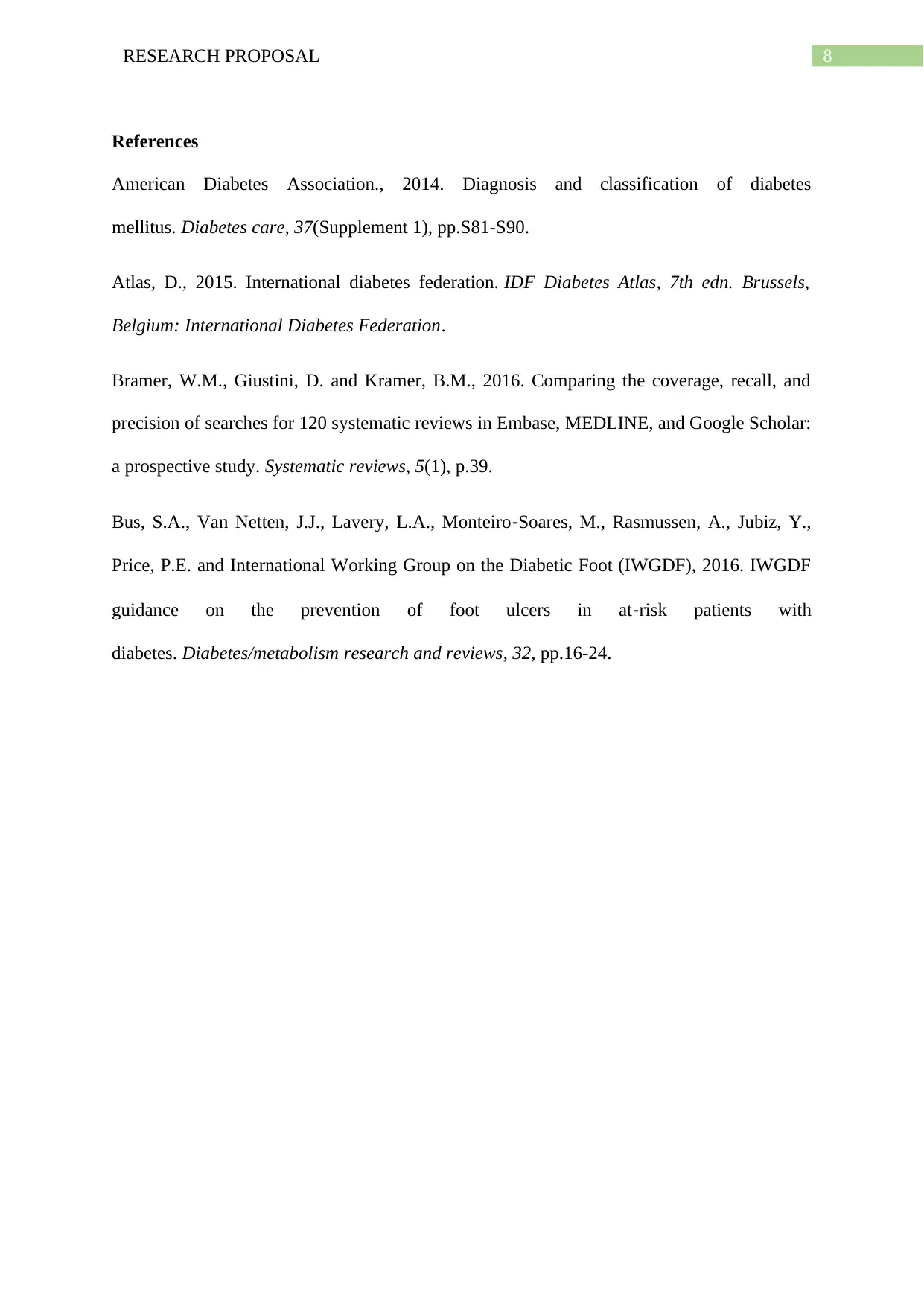
8RESEARCH PROPOSAL
References
American Diabetes Association., 2014. Diagnosis and classification of diabetes
mellitus. Diabetes care, 37(Supplement 1), pp.S81-S90.
Atlas, D., 2015. International diabetes federation. IDF Diabetes Atlas, 7th edn. Brussels,
Belgium: International Diabetes Federation.
Bramer, W.M., Giustini, D. and Kramer, B.M., 2016. Comparing the coverage, recall, and
precision of searches for 120 systematic reviews in Embase, MEDLINE, and Google Scholar:
a prospective study. Systematic reviews, 5(1), p.39.
Bus, S.A., Van Netten, J.J., Lavery, L.A., Monteiro‐Soares, M., Rasmussen, A., Jubiz, Y.,
Price, P.E. and International Working Group on the Diabetic Foot (IWGDF), 2016. IWGDF
guidance on the prevention of foot ulcers in at‐risk patients with
diabetes. Diabetes/metabolism research and reviews, 32, pp.16-24.
References
American Diabetes Association., 2014. Diagnosis and classification of diabetes
mellitus. Diabetes care, 37(Supplement 1), pp.S81-S90.
Atlas, D., 2015. International diabetes federation. IDF Diabetes Atlas, 7th edn. Brussels,
Belgium: International Diabetes Federation.
Bramer, W.M., Giustini, D. and Kramer, B.M., 2016. Comparing the coverage, recall, and
precision of searches for 120 systematic reviews in Embase, MEDLINE, and Google Scholar:
a prospective study. Systematic reviews, 5(1), p.39.
Bus, S.A., Van Netten, J.J., Lavery, L.A., Monteiro‐Soares, M., Rasmussen, A., Jubiz, Y.,
Price, P.E. and International Working Group on the Diabetic Foot (IWGDF), 2016. IWGDF
guidance on the prevention of foot ulcers in at‐risk patients with
diabetes. Diabetes/metabolism research and reviews, 32, pp.16-24.
⊘ This is a preview!⊘
Do you want full access?
Subscribe today to unlock all pages.

Trusted by 1+ million students worldwide
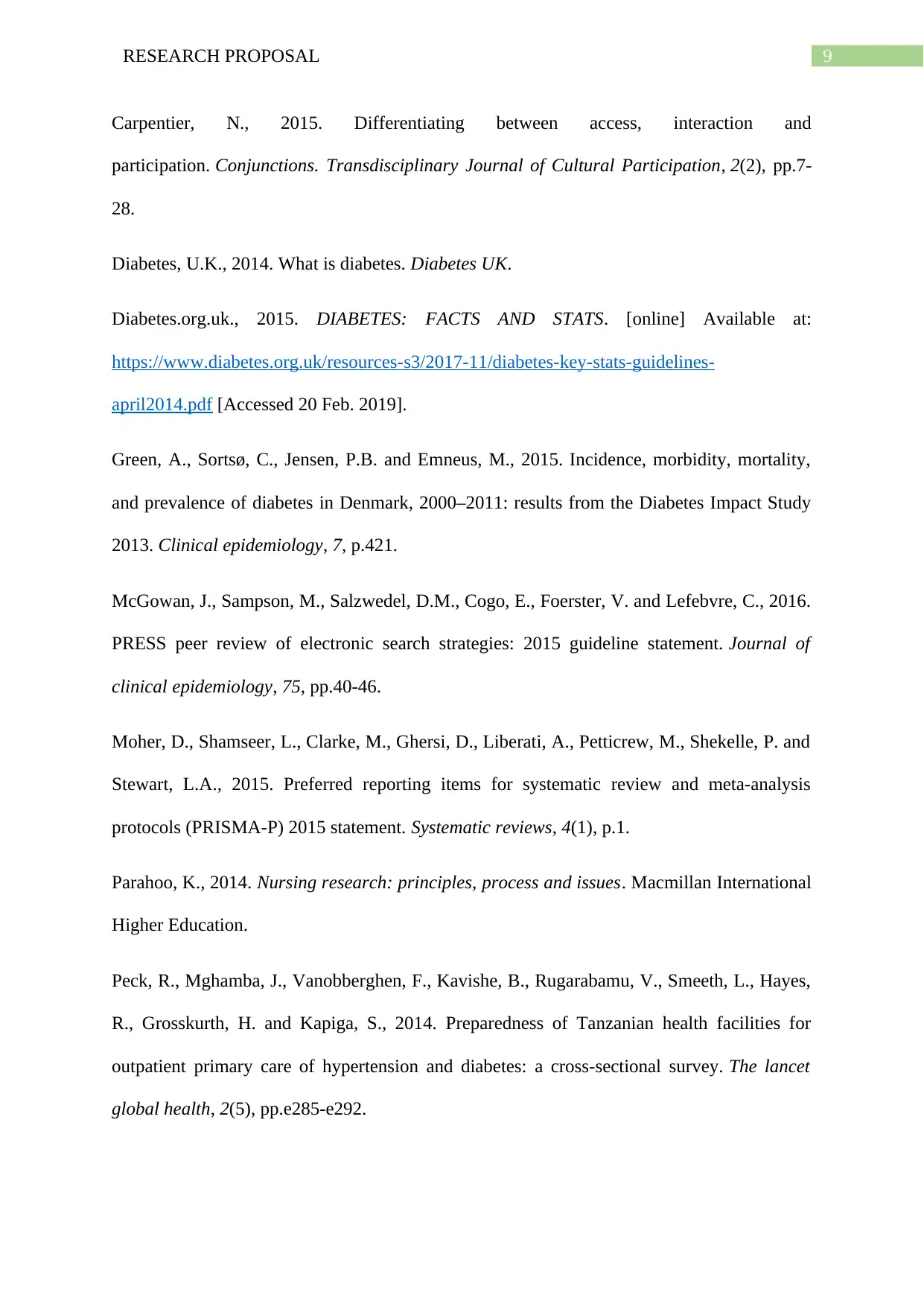
9RESEARCH PROPOSAL
Carpentier, N., 2015. Differentiating between access, interaction and
participation. Conjunctions. Transdisciplinary Journal of Cultural Participation, 2(2), pp.7-
28.
Diabetes, U.K., 2014. What is diabetes. Diabetes UK.
Diabetes.org.uk., 2015. DIABETES: FACTS AND STATS. [online] Available at:
https://www.diabetes.org.uk/resources-s3/2017-11/diabetes-key-stats-guidelines-
april2014.pdf [Accessed 20 Feb. 2019].
Green, A., Sortsø, C., Jensen, P.B. and Emneus, M., 2015. Incidence, morbidity, mortality,
and prevalence of diabetes in Denmark, 2000–2011: results from the Diabetes Impact Study
2013. Clinical epidemiology, 7, p.421.
McGowan, J., Sampson, M., Salzwedel, D.M., Cogo, E., Foerster, V. and Lefebvre, C., 2016.
PRESS peer review of electronic search strategies: 2015 guideline statement. Journal of
clinical epidemiology, 75, pp.40-46.
Moher, D., Shamseer, L., Clarke, M., Ghersi, D., Liberati, A., Petticrew, M., Shekelle, P. and
Stewart, L.A., 2015. Preferred reporting items for systematic review and meta-analysis
protocols (PRISMA-P) 2015 statement. Systematic reviews, 4(1), p.1.
Parahoo, K., 2014. Nursing research: principles, process and issues. Macmillan International
Higher Education.
Peck, R., Mghamba, J., Vanobberghen, F., Kavishe, B., Rugarabamu, V., Smeeth, L., Hayes,
R., Grosskurth, H. and Kapiga, S., 2014. Preparedness of Tanzanian health facilities for
outpatient primary care of hypertension and diabetes: a cross-sectional survey. The lancet
global health, 2(5), pp.e285-e292.
Carpentier, N., 2015. Differentiating between access, interaction and
participation. Conjunctions. Transdisciplinary Journal of Cultural Participation, 2(2), pp.7-
28.
Diabetes, U.K., 2014. What is diabetes. Diabetes UK.
Diabetes.org.uk., 2015. DIABETES: FACTS AND STATS. [online] Available at:
https://www.diabetes.org.uk/resources-s3/2017-11/diabetes-key-stats-guidelines-
april2014.pdf [Accessed 20 Feb. 2019].
Green, A., Sortsø, C., Jensen, P.B. and Emneus, M., 2015. Incidence, morbidity, mortality,
and prevalence of diabetes in Denmark, 2000–2011: results from the Diabetes Impact Study
2013. Clinical epidemiology, 7, p.421.
McGowan, J., Sampson, M., Salzwedel, D.M., Cogo, E., Foerster, V. and Lefebvre, C., 2016.
PRESS peer review of electronic search strategies: 2015 guideline statement. Journal of
clinical epidemiology, 75, pp.40-46.
Moher, D., Shamseer, L., Clarke, M., Ghersi, D., Liberati, A., Petticrew, M., Shekelle, P. and
Stewart, L.A., 2015. Preferred reporting items for systematic review and meta-analysis
protocols (PRISMA-P) 2015 statement. Systematic reviews, 4(1), p.1.
Parahoo, K., 2014. Nursing research: principles, process and issues. Macmillan International
Higher Education.
Peck, R., Mghamba, J., Vanobberghen, F., Kavishe, B., Rugarabamu, V., Smeeth, L., Hayes,
R., Grosskurth, H. and Kapiga, S., 2014. Preparedness of Tanzanian health facilities for
outpatient primary care of hypertension and diabetes: a cross-sectional survey. The lancet
global health, 2(5), pp.e285-e292.
Paraphrase This Document
Need a fresh take? Get an instant paraphrase of this document with our AI Paraphraser
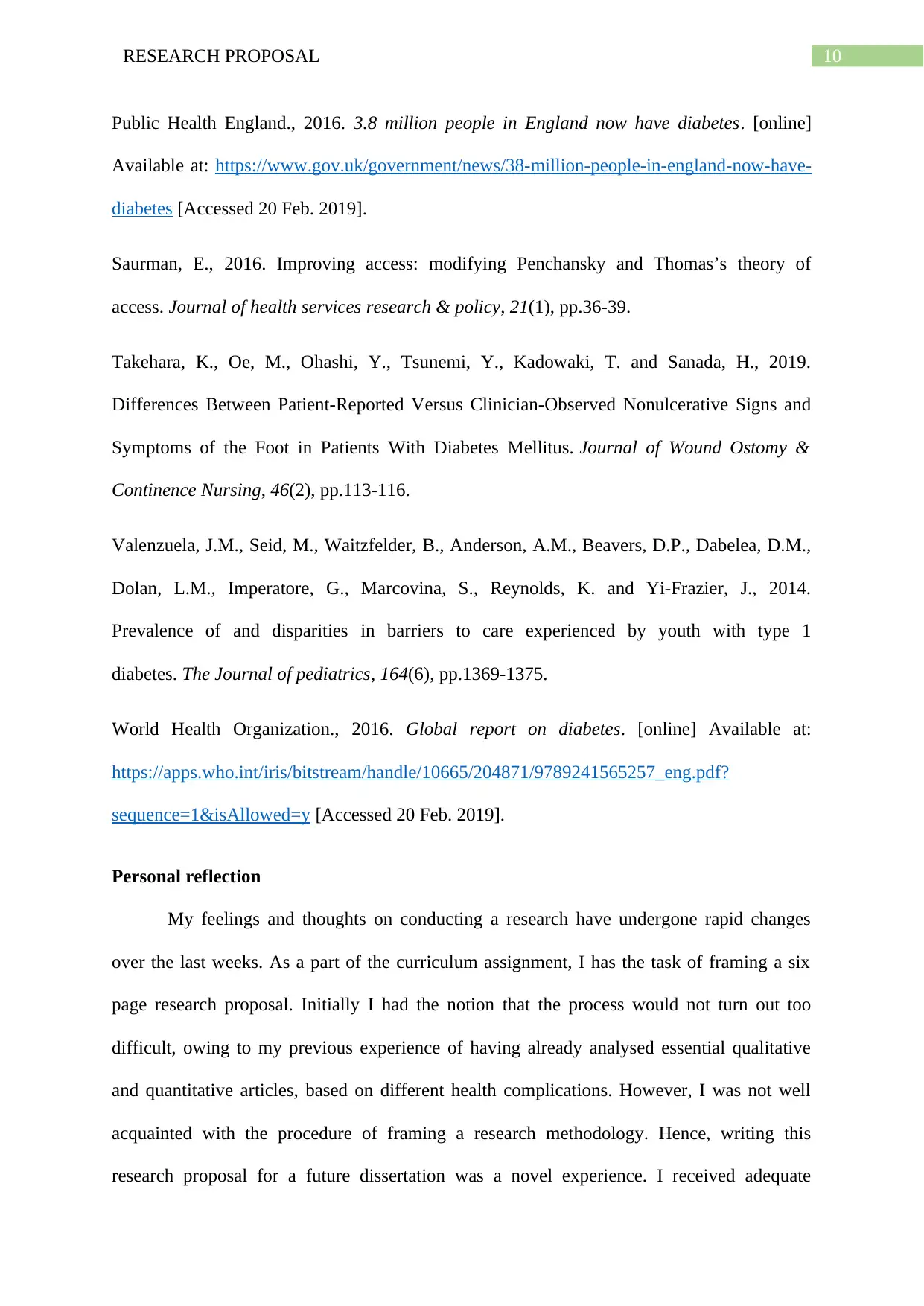
10RESEARCH PROPOSAL
Public Health England., 2016. 3.8 million people in England now have diabetes. [online]
Available at: https://www.gov.uk/government/news/38-million-people-in-england-now-have-
diabetes [Accessed 20 Feb. 2019].
Saurman, E., 2016. Improving access: modifying Penchansky and Thomas’s theory of
access. Journal of health services research & policy, 21(1), pp.36-39.
Takehara, K., Oe, M., Ohashi, Y., Tsunemi, Y., Kadowaki, T. and Sanada, H., 2019.
Differences Between Patient-Reported Versus Clinician-Observed Nonulcerative Signs and
Symptoms of the Foot in Patients With Diabetes Mellitus. Journal of Wound Ostomy &
Continence Nursing, 46(2), pp.113-116.
Valenzuela, J.M., Seid, M., Waitzfelder, B., Anderson, A.M., Beavers, D.P., Dabelea, D.M.,
Dolan, L.M., Imperatore, G., Marcovina, S., Reynolds, K. and Yi-Frazier, J., 2014.
Prevalence of and disparities in barriers to care experienced by youth with type 1
diabetes. The Journal of pediatrics, 164(6), pp.1369-1375.
World Health Organization., 2016. Global report on diabetes. [online] Available at:
https://apps.who.int/iris/bitstream/handle/10665/204871/9789241565257_eng.pdf?
sequence=1&isAllowed=y [Accessed 20 Feb. 2019].
Personal reflection
My feelings and thoughts on conducting a research have undergone rapid changes
over the last weeks. As a part of the curriculum assignment, I has the task of framing a six
page research proposal. Initially I had the notion that the process would not turn out too
difficult, owing to my previous experience of having already analysed essential qualitative
and quantitative articles, based on different health complications. However, I was not well
acquainted with the procedure of framing a research methodology. Hence, writing this
research proposal for a future dissertation was a novel experience. I received adequate
Public Health England., 2016. 3.8 million people in England now have diabetes. [online]
Available at: https://www.gov.uk/government/news/38-million-people-in-england-now-have-
diabetes [Accessed 20 Feb. 2019].
Saurman, E., 2016. Improving access: modifying Penchansky and Thomas’s theory of
access. Journal of health services research & policy, 21(1), pp.36-39.
Takehara, K., Oe, M., Ohashi, Y., Tsunemi, Y., Kadowaki, T. and Sanada, H., 2019.
Differences Between Patient-Reported Versus Clinician-Observed Nonulcerative Signs and
Symptoms of the Foot in Patients With Diabetes Mellitus. Journal of Wound Ostomy &
Continence Nursing, 46(2), pp.113-116.
Valenzuela, J.M., Seid, M., Waitzfelder, B., Anderson, A.M., Beavers, D.P., Dabelea, D.M.,
Dolan, L.M., Imperatore, G., Marcovina, S., Reynolds, K. and Yi-Frazier, J., 2014.
Prevalence of and disparities in barriers to care experienced by youth with type 1
diabetes. The Journal of pediatrics, 164(6), pp.1369-1375.
World Health Organization., 2016. Global report on diabetes. [online] Available at:
https://apps.who.int/iris/bitstream/handle/10665/204871/9789241565257_eng.pdf?
sequence=1&isAllowed=y [Accessed 20 Feb. 2019].
Personal reflection
My feelings and thoughts on conducting a research have undergone rapid changes
over the last weeks. As a part of the curriculum assignment, I has the task of framing a six
page research proposal. Initially I had the notion that the process would not turn out too
difficult, owing to my previous experience of having already analysed essential qualitative
and quantitative articles, based on different health complications. However, I was not well
acquainted with the procedure of framing a research methodology. Hence, writing this
research proposal for a future dissertation was a novel experience. I received adequate
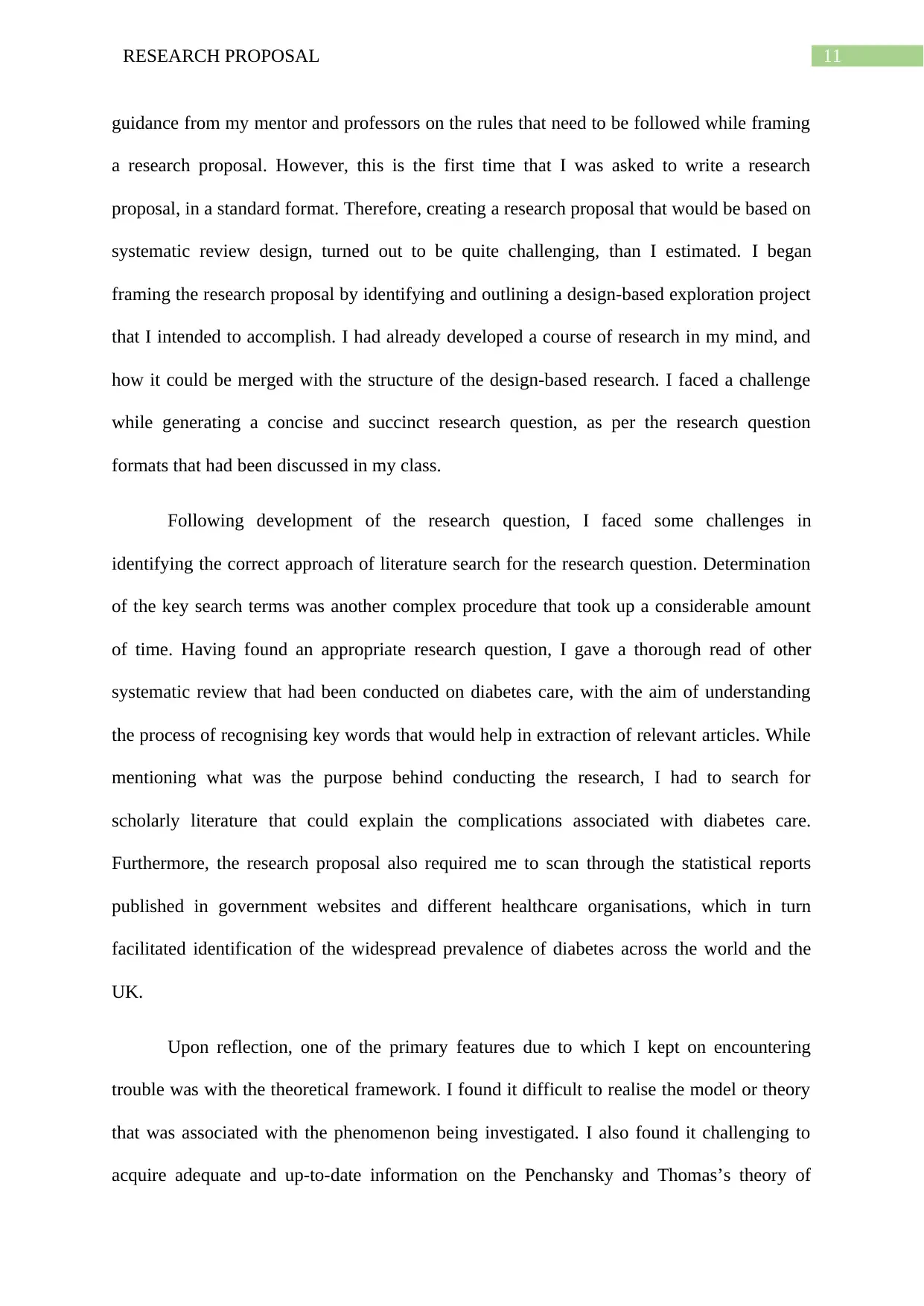
11RESEARCH PROPOSAL
guidance from my mentor and professors on the rules that need to be followed while framing
a research proposal. However, this is the first time that I was asked to write a research
proposal, in a standard format. Therefore, creating a research proposal that would be based on
systematic review design, turned out to be quite challenging, than I estimated. I began
framing the research proposal by identifying and outlining a design-based exploration project
that I intended to accomplish. I had already developed a course of research in my mind, and
how it could be merged with the structure of the design-based research. I faced a challenge
while generating a concise and succinct research question, as per the research question
formats that had been discussed in my class.
Following development of the research question, I faced some challenges in
identifying the correct approach of literature search for the research question. Determination
of the key search terms was another complex procedure that took up a considerable amount
of time. Having found an appropriate research question, I gave a thorough read of other
systematic review that had been conducted on diabetes care, with the aim of understanding
the process of recognising key words that would help in extraction of relevant articles. While
mentioning what was the purpose behind conducting the research, I had to search for
scholarly literature that could explain the complications associated with diabetes care.
Furthermore, the research proposal also required me to scan through the statistical reports
published in government websites and different healthcare organisations, which in turn
facilitated identification of the widespread prevalence of diabetes across the world and the
UK.
Upon reflection, one of the primary features due to which I kept on encountering
trouble was with the theoretical framework. I found it difficult to realise the model or theory
that was associated with the phenomenon being investigated. I also found it challenging to
acquire adequate and up-to-date information on the Penchansky and Thomas’s theory of
guidance from my mentor and professors on the rules that need to be followed while framing
a research proposal. However, this is the first time that I was asked to write a research
proposal, in a standard format. Therefore, creating a research proposal that would be based on
systematic review design, turned out to be quite challenging, than I estimated. I began
framing the research proposal by identifying and outlining a design-based exploration project
that I intended to accomplish. I had already developed a course of research in my mind, and
how it could be merged with the structure of the design-based research. I faced a challenge
while generating a concise and succinct research question, as per the research question
formats that had been discussed in my class.
Following development of the research question, I faced some challenges in
identifying the correct approach of literature search for the research question. Determination
of the key search terms was another complex procedure that took up a considerable amount
of time. Having found an appropriate research question, I gave a thorough read of other
systematic review that had been conducted on diabetes care, with the aim of understanding
the process of recognising key words that would help in extraction of relevant articles. While
mentioning what was the purpose behind conducting the research, I had to search for
scholarly literature that could explain the complications associated with diabetes care.
Furthermore, the research proposal also required me to scan through the statistical reports
published in government websites and different healthcare organisations, which in turn
facilitated identification of the widespread prevalence of diabetes across the world and the
UK.
Upon reflection, one of the primary features due to which I kept on encountering
trouble was with the theoretical framework. I found it difficult to realise the model or theory
that was associated with the phenomenon being investigated. I also found it challenging to
acquire adequate and up-to-date information on the Penchansky and Thomas’s theory of
⊘ This is a preview!⊘
Do you want full access?
Subscribe today to unlock all pages.

Trusted by 1+ million students worldwide
1 out of 13
Related Documents
Your All-in-One AI-Powered Toolkit for Academic Success.
+13062052269
info@desklib.com
Available 24*7 on WhatsApp / Email
![[object Object]](/_next/static/media/star-bottom.7253800d.svg)
Unlock your academic potential
Copyright © 2020–2026 A2Z Services. All Rights Reserved. Developed and managed by ZUCOL.




